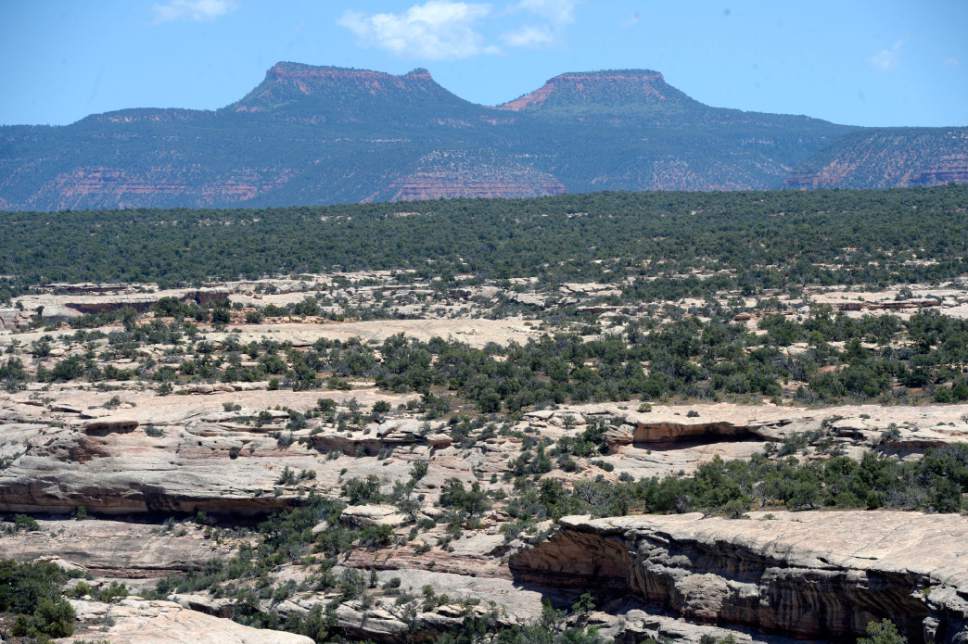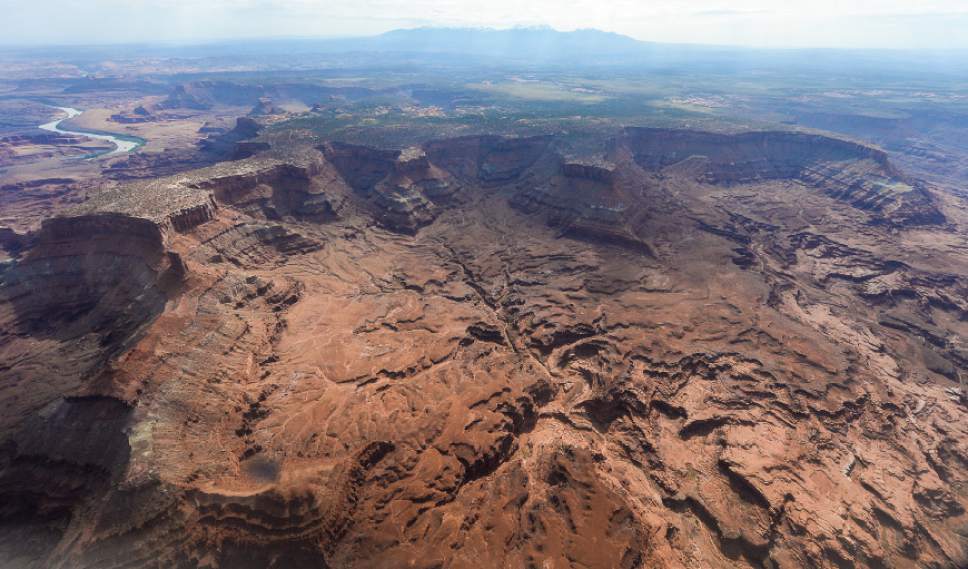This is an archived article that was published on sltrib.com in 2017, and information in the article may be outdated. It is provided only for personal research purposes and may not be reprinted.
Washington • Newly minted Interior Secretary Ryan Zinke had barely been confirmed by the Senate on Wednesday as protesters gathered outside the department's Washington headquarters to argue for preserving the Bears Ears National Monument in southeastern Utah.
"Ho, ho, hey, hey, Bears Ears is here to stay," chanted the crowd, which included two people in bear costumes.
While a small protest by Washington standards, the few dozen people with signs arguing to "Stand with Bears Ears" signaled the challenge that lay ahead for the former Montana congressman who takes office amid a long-simmering fight over control of public lands and efforts to boost oil and gas drilling.
Environmentalists offered their cautious praise of Zinke, who has voted against selling off federal lands but also backed legislation to weaken the Endangered Species Act and voted for a House rule that would make it easier for states to take over public acreage.
"As secretary of the Interior, Ryan Zinke assumes responsibility for the nation's priceless heritage of natural resources, including our great systems of national parks, national wildlife refuges, and public lands and our laws and programs that protect imperiled species and other wildlife," said Jamie Rappaport Clark, CEO and president of Defenders of Wildlife. "Although his voting record in Congress has been troubling, we hope he will recognize and uphold his trust responsibility for stewardship of these fundamental American values."
The Bears Ears monument, which President Barack Obama named just weeks before leaving office, could be one of the first tests of Zinke's plans for the Interior Department. Utah's congressional and state leaders are pushing President Donald Trump to rescind the monument declaration — a move unprecedented in the 111-year history of the Antiquities Act — while environmental groups and tribal leaders are urging the new administration to let the monument stand.
While not specifically mentioning Bears Ears, Zinke said during his confirmation hearing that monument declarations should include local input.
"When it comes to a monument, I think the state should have a say on it," Zinke told the Senate Energy and Natural Resources Committee in January. "There's no doubt the president has the power to amend a monument. It will be interesting to see if a president can nullify a monument. Legally, it's untested."
Zinke vowed in that confirmation hearing he would visit Utah as one of his first acts. His office did not respond to a request for comment on when that trip might occur.
Scott Groene, executive director of the Southern Utah Wilderness Alliance, said in a statement that his group has "grave concerns" that Zinke may have been misled by Utah's congressional delegation and local officials about the monument.
"We urge Secretary Zinke to meet with all stakeholders regarding the Bears Ears monument, including representatives from the Inter-Tribal Coalition, and to proceed with caution and significant forethought," Groene said, adding that Zinke should also reject any calls to winnow the size of the 20-year-old Grand Staircase-Escalante National Monument.
Tribal leaders, who have already invited Zinke to visit the Bears Ears region, said they were hopeful the new secretary would meet with them before considering any action on the Utah monument.
"Our message to the secretary is this: Our nations came together and worked closely with the U.S. government to finally recognize Bears Ears as cultural and historic lands that carry deep meaning for our peoples," said Alfred Lomahquahu, vice chairman of the Hopi Tribe and co-chair of the Bears Ears Inter-Tribal Coalition. "Bears Ears National Monument represents a commitment between five sovereign tribal nations and the U.S. government that we wholly expect to be honored and maintained."
Rep. Rob Bishop, the chairman of the House Natural Resources Committee, praised Zinke's confirmation, which came in a 68-31 vote with only Democrats opposing him.
"Secretary Zinke is prepared to lead the Department of the Interior in a new and better direction, and I congratulate him on his confirmation," Bishop said. "In collaboration with our state, tribal and local partners, I look forward to working with Secretary Zinke in the months ahead."
Sen. Mike Lee, R-Utah, said in a Facebook post he is "excited" to work with Zinke, who Lee added, "has confirmed to me that he would like to see states like Utah play a greater role in the management of the federal lands within our state.
"I am confident," Lee continued, "that we can work together to rescind the Bears Ears National Monument, increase PILT payments and ensure that state and local government interests aren't drowned out by radical special interest groups."
After eight years of the Obama administration that sought a more aggressive conservation agenda, the oil and gas industry was eager to see Zinke confirmed.
"Now that he is in office, we can get on with responsible development of oil and natural gas resources on appropriate public lands," said Kathleen Sgamma, president of the Western Energy Alliance. "With the shift in the White House away from punishing the industry to actually encouraging domestic production, the Western oil and natural gas industry can help the Trump Administration create jobs and economic opportunity across the nation.
The Interior Department Zinke will lead includes oversight of 500 million acres of federal lands and waters, including nearly 2 billion acres of the outer continental shelf, as well as multiple agencies — from the Bureau of Land Management and the National Park Service to the Bureau of Indian Affairs and Bureau of Reclamation — and more than 70,000 employees.





